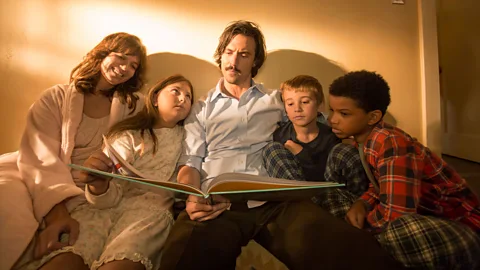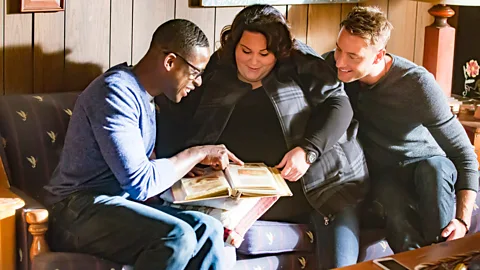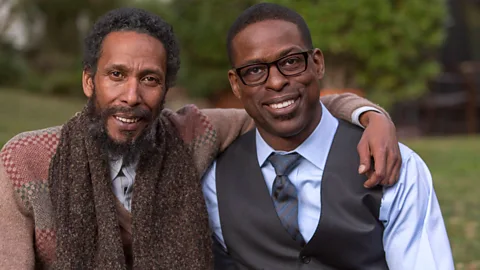This is Us: 2022's most anticipated TV finale
 Disney+
Disney+After six years, This is Us is about to end. Kesewaa Browne explores how a 'very simple story' became a number one TV hit.
For six years, NBC's This is Us has captivated fans – like myself – with its depiction of the everyday life of the Pearson family, their tragedies, and real, ugly and relatable human flaws. I started watching season one just after the show's 2016 premiere, little expecting the emotional journey it would take me on. As the show progressed, it felt as if every episode had the same psychological depth as a feature film. At times it seemed like the Pearsons were holding up a mirror, and people I knew in real life were staring back. Over its six series, this show about a seemingly regular Pittsburgh family was both a critical hit and audience phenomenon, trending weekly on social media. Now as its final season draws to a close next week, it's time to say one final goodbye to This is Us and the characters that so many viewers routinely fell in and out of love with.
Created by Dan Fogelman, This is Us follows the lives of two parents, Jack Pearson (Milo Ventimiglia), and Rebecca Pearson (Mandy Moore) and their three children – Kate (Chrissy Metz), Kevin (Justin Hartley) and Randall (Sterling K. Brown) – also known as the "Big Three". Spanning the present, past and future using flashbacks and flashforwards, it interweaves significant moments in the characters' lives that illuminate their complex family history and why they are the way they are.
 Disney+
Disney+Kate and Kevin are two surviving siblings of triplets who were born prematurely, while their brother Kyle was stillborn. In the past, we see how Jack, who is seen in the eyes of his family and almost every character as saint-like, and whose presence underpins the entire show, decided to adopt a black child, Randall, who was born earlier that day after his biological father, William (Ron Cephas Jones), abandoned him at a fire station. Randall goes 36 years without knowing much about his biological parents, and right up to adulthood the Pearson siblings endure unspoken rivalries until they bubble and boil over to the surface.
The characters are complex. Jack is a loving dad and a war veteran who also has an alcohol problem. William was a once hopeful musician but later turns to substance abuse and in his old age has cancer. Kate struggles with her body image. Sadly, Jack dies when the Pearson siblings are just 17. And now in the present day, matriarch Rebecca is diagnosed with Alzheimer's that is progressively getting worse. Right in front our eyes, we watch the Pearson family matriarch become a shell of her former vibrant self, and the pain that comes with that.
Knowing the endgame
"It's been quite a journey," says TV critic and HuffPost's senior culture reporter Candice Frederick. The show's flashbacks work, she argues, "because there's already an understanding of how this story is going to end and unfold. I think that is fairly rare for a series because usually you just wait for a show to get renewed" – but the characters' journeys were clearly planned out. Insider's entertainment reporter, Esme Mazzeo, tells BBC Culture that "the structure and the narrative in This is Us were really unique to me when it first started". Showrunner Fogelman has revealed that he had the whole story, or most of it, planned out from the beginning, saying in an interview last year that: "We know what our plan is. That’s been part of the great benefit of, from the very beginning… allowing us to kind of know our endgame."
Mazzeo argues: "That's a real advantage… a lot of shows just want to keep going, so wild things happen to keep it going or to keep the drama going. This is Us just always had this story in mind that it was going to tell, and I think that's important." Even in the pilot episode, we see hints about what will happen in the Pearsons' lives later on. Our worst fears that Jack could be dead are confirmed in Season 1, Episode 5 when Kate presents the urn of her dad's ashes. "Easter eggs" are planted throughout the six seasons and the direction the show was going in was always clear-cut "with exceptions", Frederick believes. These exceptions include the insertion of contemporary events like the Covid-19 pandemic and the 2020 resurgence of the Black Lives Matter movement into the programme. These storylines received criticism because they touched upon current issues.
 Disney+
Disney+Yet the show's racial exploration was not new. We saw Rebecca confront her mother about how poorly she treats Randall because he's black. We witnessed a young Randall in the grocery store pine over the black customers, wondering if they are his biological family, and we've heard Kevin imply that his brother "isn't black enough" and that he gets special treatment from their mother because of his skin colour. This all happened several storylines before he confronted his siblings as an adult in 2020's season five, and they had uncomfortable conversations about race, in the wake of George Floyd's murder.
"If you give us present-day characters or present-day storylines, there need to be references to large things that are going on," Frederick comments. "A racial reckoning and a pandemic is unavoidable, it's everywhere." During the six-season run, Randall has always wrestled with a sense of isolation within his own family because he didn't look like them and had unanswered questions about his background, some that were later answered. "It would be weird to not have some kind of confrontation because they were already doing that," says Frederick.
Since it first premiered, This is Us has been nominated for 38 Emmys. According to Frederick, one of the reasons for the show's success is the storylines "being so grounded in real life". What we see on screen are things "we all bring from our personal experiences", says the show's co-executive producer and writer Elan Mastai. "We boil down all our personal experiences and you get a rich and intense essence that becomes the outcome of the saga of the Pearsons. We joke as writers that we've all saved thousands of dollars in therapy by working on this show."
 Disney+
Disney+The overwhelming presence of the Pearson's dead father, Jack, and the fact the characters are still navigating their grief in the present day is very relatable for audiences. Randall has a superhero dad complex as he wants to emulate Jack and fix unfixable situations. Having never allowed himself to properly grieve, Kevin feels the need to impress his dad beyond the grave and live up to whatever he thought his dad's expectations were. "Grief is not something you ever really get through, you just move through it," says Frederick, and the show highlights that very well.
According to Mastai, these elements of reality are part of their mission. The writers "are pouring their own personal lives into this show, our childhoods, our romantic obstacles. People are very candid in the writers' room about what they go through," and that translates on screen, he says. "[When we write the show] we try and be emotionally open and honest about what it means to be alive right now."
Network longevity
There's also a benefit to the momentum built up by a traditional network show like This is Us, which airs on NBC in the US. In the era of streaming giants such as HBO Max and Netflix, we can binge the whole of a series when it drops – whereas This is Us inspires a different kind of engagement by being shown on a weekly basis. "There's a sense of a continued run versus dropping 10 episodes," says Frederick. That type of show might generate a lot of buzz on the day, but it's not sustained, she argues. "Whereas with networks you're getting [a show] constantly, like six or seven years straight. It's more of an event people can look forward to rather than a moment."
And, of course, there's the actors. In 2017, Sterling K. Brown became the first black actor in nearly 20 years to win the Emmy for lead actor in a drama for his performance as Randall. Mazzeo argues that "there's such a charm to Milo Ventimiglia", while Moore – a former teen singer – has also drawn praise. Mazzeo believes she finally deserves an Emmy this year for her performance because of the mastery with which she spans so many decades of her character's life, while Frederick agrees that "she's superb and is doing what no one else right now is doing. I know her from being a pop star and it's a huge turnaround."
 Disney+
Disney+Together, the cast has a mesmerising chemistry. In particular, Moore and Ventimiglia's relationship on screen feels incredibly natural – meaning that emotionally moving moments resonate even more. "The centre of the Pearson universe is these two people," says Mazzeo. "Things build outside of it and around them, but they're the core of the show… their chemistry was strong enough to pull the show through – I think that's a huge testament to them." As a viewer, it's hard not to be invested in every character, even the ones that have us side-eyeing and throwing our hands up in dismay, such as Randall going behind his siblings' backs to guilt-trip Rebecca into g up for a medical trial and Kevin rarely taking ability for his actions or apologising for the mean words he hurls at his brother and sister. As Mazzeo says, "there's a certain tone to This Is Us that would be missing without them".
Despite the emotional punch of the series, its writers have aimed to create nuanced stories that span a spectrum of tones, Mastai says. "We're not just trying to make audiences cry. We don't just want one thing, we want the episodes to feel like an emotional journey – where people are going to feel emotional, [and] they're going to feel moved, but also going to feel uplifted." One element that shines through is the sense of the Pearsons trying to be there for each other. "It's the portrait of a family," says Mastai. "It's a tapestry we are weaving across generations and people find different entry points… We've been able to tell the story as a very simple story about a family."
It's a simple story that's now drawing to a close – and even that is something the show has done in its own way. "It's a very rare thing, from what I've seen on network TV… that [a show] can end on its own ," says Mazzeo. "It has a beginning, middle and an end and then it's done. That's so rare, such an advantage. And I can't think of another [show] where they were given that freedom and given that trust, to end how they wanted to."
But what should we anticipate in the final episode? "The audience should just expect a really heartfelt, honest, uplifting goodbye to characters they hopefully have come to care about over six years as much as we the writers do," says Mastai. "All the important questions will have been answered… [it will be an] emotional send-off to this family that's meant so much to so many."
And that family is all that This is Us has needed to keep the world hooked. "We're still the number one show on network television in America… six years in," says Mastai. "One of the biggest shows in the world has no murders, no surgeons, no lawyers… no battles, no saving the world. It's just a story about a family who's trying to be there for each other through life's ups and downs."
The final episode of This is Us airs on NBC in the US on 24 May and on Disney+ and Amazon Prime in the UK on 26 May.
Love film and TV? BBC Culture Film and TV Club on Facebook, a community for cinephiles all over the world.
If you would like to comment on this story or anything else you have seen on BBC Culture, head over to our Facebook page or message us on Twitter.
And if you liked this story, sign up for the weekly bbc.com features newsletter, called The Essential List. A handpicked selection of stories from BBC Future, Culture, Worklife and Travel, delivered to your inbox every Friday.
